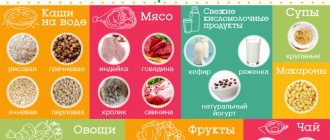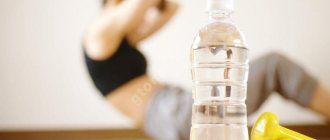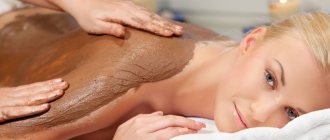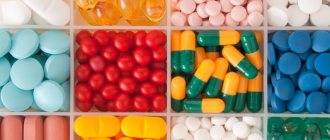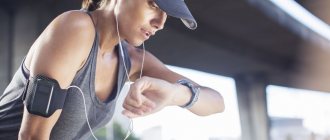Why you shouldn't run after eating
Bloating and discomfort appear in the abdomen
Digestion is a chemical and mechanical process. First, you chew, preferably slowly, to sufficiently chop the food, and at this time the necessary enzymes are already released in the stomach.
If you don’t have time to pause between meals and training, then most likely you eat quickly, without having time to chew thoroughly and without giving your gastrointestinal tract the opportunity to effectively digest food and absorb all the necessary substances. This results in bloating, constipation or indigestion. For some, this happens already during training.
The functioning of the gastrointestinal tract is disrupted
During running, blood flow accelerates - it rushes to the working muscles to deliver oxygen and nutrients to them. At the same time, it continues to saturate the internal organs as usual.
During meals, additional blood volume must flow to the gastrointestinal tract. And then it turns out that the muscles and the digestive system compete for their portion of blood.
By the way, there is a version that it is for this reason that cramps can occur - the muscles do not have enough nutrients, which should be supplied to the blood in time.
Subscribe to “Marathon Man” on Telegram. Announcements of articles and useful selections every week.
Stomach problems while running: why they occur and how to avoid them
The effect of training decreases
This point follows from the previous one. In normal life, supplying muscles accounts for 15-20% of the total blood volume in the body. During training, this figure increases several times. But if you ate a hearty meal and immediately went running, your muscles will not receive the required volume of blood along with oxygen and nutrients, which means they will not respond to the load.
As a result, the effect of the training will be lower than planned. Moreover, when you are full, insulin and serotonin are produced, which will put you into a relaxed, sleepy state.
Heartburn begins
After swallowing, food enters the esophagus, which is a kind of extension of the throat and connects it to the stomach. From the esophagus, food moves to the stomach, passing through the sphincter, which protects the esophagus from the entry of aggressive contents from the stomach.
When running, stomach acids can back up into the esophagus, causing heartburn and belching. The same thing happens if you bend over or do abs exercises after eating.
Why you shouldn't run on a full stomach
Before considering the question of how long you can run after eating, let’s figure out what harm this can cause to a person. There are two problems. First, running on a full stomach is difficult. At one time a person consumes 0.5-1 kg of food. This is the weight of one dumbbell, which is usually used for additional load when running. That is, it will be physically harder to run.
The second problem is the lack of blood to simultaneously digest food and supply blood to working muscles. When running, blood flows in large quantities to the striated muscles, and after eating it is also busy supplying oxygen to the smooth muscles (all digestive organs). Now imagine that you are running immediately after eating - the amount of blood is simply not enough to work “on two fronts” and the person gets tired faster. That is, in this case, food is additional ballast, which is better to throw off.
The quality of your run depends, among other things, on how long ago you ate.
Food digestion time table
To make it easier to navigate, it’s worth dividing all products into:
- Easily digestible - fast carbohydrates that take up to an hour to digest: fruits, juices, berries.
- Moderately digestible - slow carbohydrates and vegetable fats, digested in 2-3 hours: vegetables, herbs, cereals, bread, cereals, pasta, bananas, dried fruits, milk, avocados.
- Difficult to digest - proteins and animal fats that take more than 3 hours to digest: meat, eggs, fish, seafood, legumes, nuts, seeds, hard cheese, mushrooms.
Sausages, canned food, alcohol, tea, coffee, fast food, baked goods made from white flour, sugar, candies, and chocolate are poorly digestible.
There is an opinion that breakfast is digested faster than lunch. But it is not exactly. Moreover, there are studies with the opposite result, convincing that metabolism accelerates only towards lunch.
What kind of water can you drink after eating?
Is it possible to drink water after meals and what liquid is best to drink during lunch? Since water is tasteless and does not irritate the receptors on the tongue and stomach, digestive secretions are not produced. Therefore, if you drink water during meals, you dilute the gastric juice, which results in digestive problems. So, until the water that has entered the stomach comes out of it, the digestion of food will not occur correctly. After this, the gastric juice will reach the desired concentration and processing of the contents will begin again.
If you do not want to constantly monitor how properly food is digested in the stomach, then you need to drink water as a secretion enhancer. That is, when entering the stomach, the liquid should stimulate the production of gastric juice, so that after stopping, digestion starts with renewed vigor.
How to make sure that gastric juice is released not only when eating tasty dishes, but also when drinking? You just need to drink a cup of espresso, strong tea, fruit drink, compote or uzvar during lunch or immediately after it. These drinks stimulate the production of gastric juice. The digestion process will stop for a while and then start again. In addition, the listed drinks are beneficial for our body. At the same time, you will remain cheerful and full of strength.
Can I drink water after meals or during lunch? Let's consider another point of view on drinking special water during lunch.
Water and liquid are different things. Many of us prefer to drink some kind of beverage rather than tasteless water during meals. For example, compotes, fruit drinks, soda, sweet juices, coffee or tea. As you know, if a liquid contains calories, it cannot be considered water. Our body perceives such drinks as food: the liquid along with the food remains in the upper (proximal) part of the stomach, which tries to break down this entire mass.
Answer this question for yourself: do you often drink drinks during or after meals? Most likely, you like to wash down your food not with clean water, but with something sweet. It is quite natural that after such a dinner you do not feel very good.
So, the answer to the question of whether you can drink water after eating has been found. You can only drink water at room temperature (or warm) some time after eating. However, how much should you drink?
It is recommended to drink about 100-200 ml of water during lunch. Otherwise, the volume of the stomach will increase, given that the liquid is drunk after a heavy dinner. Drink water in small sips, tasting the healthy liquid, without trying to empty the glass as quickly as possible. Before drinking, rinse your mouth with water. Sometimes you can confuse dry mouth with true thirst.
In some cases, we feel false hunger: this is our body's way of telling us that we are dehydrated. It's not lunch time yet, but you're unbearably hungry? Drink a glass of water, maybe you're just latently thirsty.
Do you always wash down your food? To break this habit, drink water on an empty stomach. Gastric juice will be released in greater quantities, as well as saliva. It will become easier for you to swallow dry food. Chew each piece of food carefully and slowly so that the saliva moistens the food well. Then the need to drink will disappear by itself. Eat slowly, without talking or being distracted by anything.
What can you eat 30 minutes before training?
For an effective workout, the body needs energy, and it is best to get it from carbohydrates (about 70% of the portion before training), because they reduce fatigue and increase endurance. These should be foods with a low or medium glycemic index, that is, slow carbohydrates: durum wheat pasta, cereals, oatmeal, potatoes. You can add proteins to them and eat it all 1.5-2 hours before training.
If you don’t have that much time, then half an hour before training you should have a snack with carbohydrates with a high glycemic index, that is, foods that are quickly absorbed and provide the required amount of energy. The simplest options are a banana, fruit juice, muesli, toast with peanut butter or jam.
How long before training can you eat?
We figured out that you can’t run immediately after eating. So how long should it take to start training without harm to your health? If you analyze the articles already written on these topics, 1-2 hours is recommended. Why exactly so much? The fact is that it is during this time that most types of food are digested. But we believe that this period is 0.5-3 hours. Let's figure out why.
All food that a person eats can be divided into four groups:
- Fast carbohydrates.
- Slow carbohydrates.
- Squirrels.
- Fats.
The first on this list are fast carbohydrates, which are instantly absorbed by the body and within 15-25 minutes after consuming them a person can run. Fast carbohydrates include bananas and other sweet fruits, sugar, and honey. That is, if you need to go for a run, but you are hungry, then you can restore your energy by eating a banana and after 20 minutes you will go for a workout, and after it eat a more substantial meal.
Slow-release carbohydrates are considered the best source of energy when running. They take much longer to be absorbed by the body - the average time is approximately 1.5 hours. Slow carbohydrates include baked goods, all types of cereals, and pasta.
Slow and fast carbohydrates.
The processing time for proteins is 2-3 hours, so after eating food rich in them, it is better to forget about exercise during this time. But it is necessary to consume proteins, since they are a kind of building material for the body; their consumption allows you to gain muscle mass. Protein foods include all types of dairy products and meat.
The heaviest substance for the body to absorb, which takes more than three hours, is fat. They are part of fatty dairy products, such as sour cream, as well as lard, canned food and other products.
It must be taken into account that each person’s body is unique. The absorption of a certain food may take only 1 hour for one person, while for another the process may take 1.5-2 hours.
What to do if you didn’t have time to have a snack before training
First you need to remember what the task is before you and what kind of training it is. If the goal is to lose weight, and you have no more than 30 minutes to jog, then you can do it on an empty stomach. A number of studies confirm that light training on an empty stomach is more beneficial for burning fat tissue than training after eating. The main thing is, don’t forget about water - a glass “before” is a must.
If there is grueling running work ahead, a snack is necessary. Alternatively, it could be a small portion of some fruit, an energy bar, a couple of spoons of honey, sweet tea or coffee, a gainer, or a smoothie.
Running and nutrition
Those who run regularly and intensely must take care of their diet, and it should be different from the diet of those who do not play sports. Nutrition should be complete and balanced, rich in proteins, carbohydrates, vitamins and minerals. Athletes and long-distance runners also often consume various protein mixtures and energy drinks. Please note that the specifics of your diet will depend on what time of day it is best for you to run.
The body itself makes it clear what and when to eat. But it also happens that the usual routine is disrupted, or you want to eat food immediately after running or before it. This happens due to the fact that the food consumption regime does not always coincide with the training regime. For example, running in the morning can leave you feeling very tired for the day ahead. And running during the day on an empty stomach can kill your motivation. If you jog in the evening, your usual dinner may be delayed by several hours, making it difficult to fall asleep after eating. Therefore, among other things, it is important to synchronize nutrition and training.
Why can't you run after eating? Because, at a minimum, it will be very difficult, often you will feel sick after training. While jogging, the body needs strength, and this energy is already spent on processing food. In this case, the food consumed will be ballast, which is stored in fat. Hence the fact that the effectiveness of training can be greatly affected. Another question: when is it better to run - before or after meals? It all depends on your regime and what time you exercise. But in both the first and second cases, a certain amount of time must pass between jogging and eating.
What foods should you avoid before training?
Fatty and fried
It will be hardest for you to run after a heavy meal of fatty food, because it takes a long time to digest and interferes with the absorption of proteins and carbohydrates. Eliminate fried, fatty meats and cheeses from your pre-workout menu. Do not go heavy on vegetable fats such as avocado and nuts, as they also take a long time to digest.
Spicy and salty
Spicy food really speeds up metabolism, but at the same time it increases sweating and causes heartburn. And salty absorbs water, thickens the blood and complicates the transport of oxygen to the muscles. Therefore, it is better to forget about sausages, sausages, smoked meats and salty snacks, by the way, and not only before training.
High-fiber legumes and vegetables
All this is very useful, but before training it can cause bloating and heaviness.
Fast food
You will fill your stomach with it, but you will not receive the nutrients necessary for training. If you really want it, treat yourself to it after your workout. But not often.
Store-bought sauces
Do not top up your pre-run meals with sauces and mayonnaise, as they are high in fat, sugar and flavorings, which is again nothing good for productivity.
Alcohol
Just in case, we remind you that alcoholic drinks are high in calories and lead to uncoordination of movements and dehydration.
What else can you drink after a workout?
Naturally, water is not the only liquid that most athletes consume after finishing a workout. Let's look at what else you can drink.
| Liquid | Benefit |
| Protein cocktail | It helps not only restore the water-salt balance, but also close the protein window, intensely stimulating anabolic processes in the athlete’s body. |
| Gainer | It is another way to close the carbohydrate window in liquid form immediately after training, which will help you gain muscle mass faster. |
| Caffeinated drinks | It is necessary in cases where training has completely exhausted the body and there is a long day of work ahead. |
| Milk | It is an excellent alternative to mineral water, as it contains all the necessary salts, and in addition also protein. |
| BCAAs | Stimulating anabolism by taking liquid amino acids that penetrate muscle tissue, bypassing the digestive tract. |
| Tea with lemon | Lemon and the vitamin C it contains are excellent adaptogens that will help you feel better after a workout. |
| Liquid vitamins | Similar to liquid BCAA. |
Simple rules for eating before running
- After a full meal, wait at least 1.5 hours.
- Do not eat fatty, fried, salty, spicy foods 4-5 hours before training.
- The pre-workout meal should consist of 2/3 slow carbohydrates and 1/3 protein.
- 15-30 minutes before training, you can eat fast carbohydrates in the form of a fruit smoothie, banana, or drink freshly squeezed juice.
- Drink water before and during your run if it lasts more than an hour.
Read on the topic: What to eat before starting a marathon and half-marathon Running on an empty stomach: is it possible to train on an empty stomach
What can you eat before a run?
It is important to know how much food you should take before classes and what the menu should be.
If you follow certain rules, running will benefit your body:
- Helps you lose weight
- Improves your well-being.
The diet differs depending on the characteristics of the body and the time of day when you will be jogging.
The right menu will allow the body:
- burn fat effectively;
- restore energy reserves;
- don't get tired.
Morning jogging
Many people do not have time to eat in the morning. You should go jogging 0.5-1 hour after breakfast.
It is advisable to consume products:
- protein shake;
- fruits;
- eggs;
- bread;
- fruit juices.
If you feel very hungry, eat a banana or drink an energy drink. If you have enough time, you should have breakfast 1.5 hours before jogging.
It is recommended to include in the menu:
- two sandwiches;
- apple;
- yogurt;
- milk porridge with fruit;
- croutons with cheese;
- vegetables.
The energy value of breakfast should be approximately 800 kcal.
After running, you should wait an hour, then eat a meal rich in proteins and carbohydrates.
Suitable products:
- egg
- whole grain bread;
- natural juice;
- fruits;
- protein shake.
Jogging at lunch
You can go jogging at lunchtime. For example, some people dedicate their lunch break to this. If you exercise on an empty stomach, you may feel tired.
This is due to a decrease in blood sugar, because the morning breakfast has already been absorbed by the body. It is best to have a snack 1-2 hours before a run, the energy value of which will be determined based on the characteristics of the body and how high-calorie breakfast was.
It is recommended to eat foods high in carbohydrates.
For example, the following options are appropriate:
- oatmeal with milk;
- dried fruits and a glass of juice;
- toast with jam.
After running, it is permissible to eat to recharge your energy and continue working. Use dried fruits or marmalade as a quick snack. It is best to prepare shelf-stable products in advance in the form of bars, nuts, yoghurts, and fruits. Or take the food left over from dinner with you to work.
Evening jogging
Some people like to exercise in the evening. This promotes good sleep and relieves stress that has accumulated during the working day. In this case, you should eat before and after your run.
For those who train in the evenings, the following nutritional recommendations are available:
- eat food often and in small portions;
- be sure to have breakfast and lunch;
- have a light dinner.
Small portions of food will help avoid feelings of extreme hunger. It is very important not to skip breakfast; it is advisable to eat cereals, nuts, toast, low-fat milk, yoghurts, and juices. Protein food is suitable for lunch. A light dinner is recommended to prevent fat deposits and cause insomnia. Protein or fermented milk products and vegetables are suitable.
It is best to start jogging in the evening an hour after eating. Include milkshakes, berries, and fruits in your diet.
It's a good idea to eat an energy bar or fruit before your run. You shouldn't overeat, but you shouldn't go hungry either. Drinking fluids throughout the day is important. Drink two glasses of water 15-20 minutes before and after classes.
What happens to the body after eating
After eating, the “mood” hormone, serotonin, appears in the body.
It participates in metabolic processes, affects blood clotting, normalizes sleep and rest, and slows down the aging process. It also causes some drowsiness. A feeling of fatigue also sets in, as the body spends a lot of energy digesting food for some time.
And when a person is hungry, the brain produces orexins. This substance does not allow a person to sleep, but forces him to go in search of food. After eating, orexins do not enter the bloodstream, and the person begins to feel sleepy.
How long after eating can you exercise?
The information that after eating it is not recommended to subject the body to any physical activity has been known since school days. If you neglect this advice, you may experience a feeling of discomfort, fatigue and even nausea. That is why it is important to know when you can exercise after eating, so that the workout only brings benefits and is truly effective. It is worth saying that there are many different opinions about whether you should eat before exercising, and some even prefer to train on an empty stomach. All these issues need to be sorted out once and for all.
How long after eating can you exercise?
Food is the main source of energy that a person expends, including during sports. In order to process food and obtain the necessary substances from it, the body needs time and exercise during this period, that is, it is not recommended to subject itself to additional stress.
Why you should not exercise after eating:
- If little time has passed after eating, then any workout will certainly cause a feeling of discomfort and heaviness in the stomach. In addition, food provokes an increase in the level of serotonin in the blood and the person feels comfortable and a little sleepy, which means that the effectiveness of training at such a time decreases significantly. Experienced trainers, when talking about how long after eating you can’t exercise, most often give the same answer – 2-3 hours.
- Exercising after a heavy meal slows down the digestion process. This is due to the fact that during exercise a lot of blood flows to the muscles, and in order to restore balance, the body constricts the vessels that take part in other processes, in this case, digestion. In such situations, many people complain of seizures.
- It is worth mentioning another unpleasant consequence of training after eating - the occurrence of heartburn, gastroesophageal reflex and, in some cases, vomiting.
- Many women train in order to get rid of excess fat, but training immediately after eating suppresses the body's ability to use up accumulated fat.
Many people believe that it is best to train on an empty stomach, since during the digestion of food the body uses up available energy, and this reduces performance. First of all, this concerns breakfast. A huge number of people, going for a morning jog, drink only a cup of tea or coffee. Experts believe that this is a serious mistake, since the level of glycogen in the blood decreases overnight, so breakfast before training is mandatory. It is recommended to stick to the golden mean, that is, not to overeat, but not to starve. The morning meal should be light. Experts, thinking about how long after breakfast you can exercise, talk about a short period of time - 1 hour. This time is enough for the food to be absorbed.
Main conclusions
Exercising immediately after eating is harmful and does not make sense for losing weight and getting in shape; you should wait a while.
Reasons why you should not eat immediately before training:
- after eating, the body produces special hormones that relax and put you to sleep;
- The body spends a lot of energy on digestion; it takes time for the influx of new energy;
- the body cannot simultaneously efficiently perform two functions: digestion and movement.
If you wait the required interval from 20 minutes to 2-3 hours after eating, then the efforts from exercise will give an excellent result in the form of a beautiful and toned figure.
